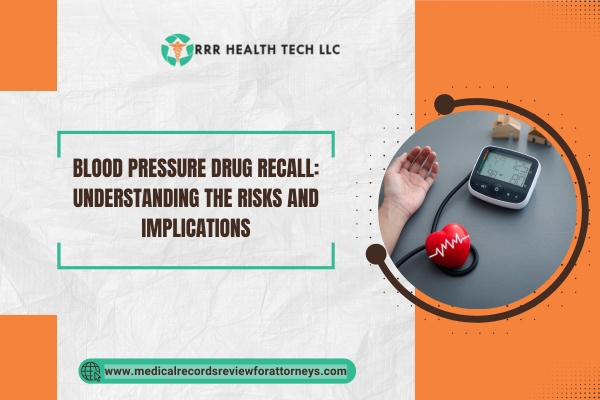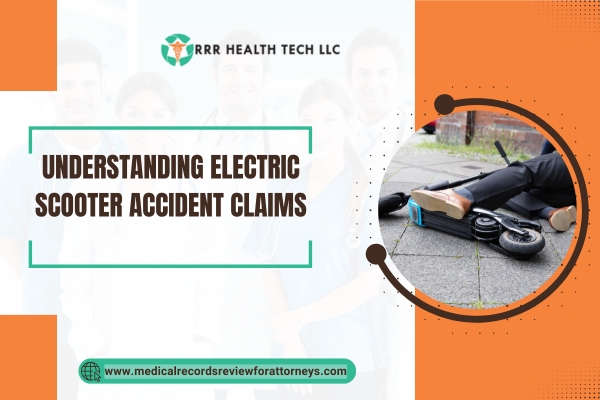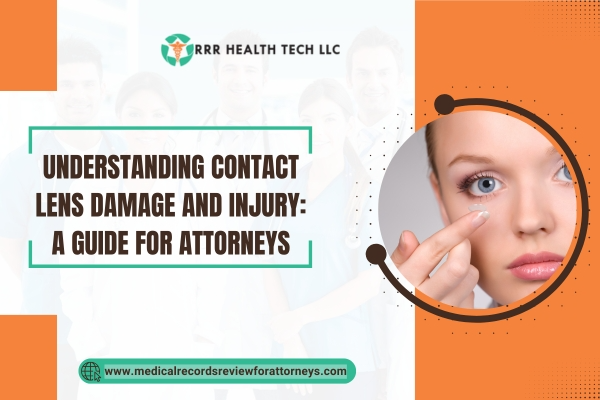
Introduction
In the past few months, the withdrawal of hypertension pharmaceuticals from the market has been troubling for providers and their patients. The FDA put serious medications risks cautions with specific blood pressure medications which are contaminated with indiscriminate particles. This article explains the details of the drug recall action undertaken, risk to health, and the legal consequences that may be incurred by the manufacturers and health care providers. Furthermore, we discuss how medical record review services can help lawyers in preparing and arguing cases of these recalls.
1. Overview of Blood Pressure Medications
Types of Blood Pressure Drugs
Blood pressure medications are classified into several categories, each serving a specific purpose in managing hypertension. Common types include:
• Diruetics: Facilitates the as secretion of sodium and water from the body to control hypertension.
• ACE Inhibitors: Relax blood vessels by blocking the enzyme that constricts them.
• Beta Blockers: Lower the heart rate and the workload of the heart.
• Relaxed blood vessels: Prevent calcium from entering the cells of the heart and blood vessels, which get relaxed secondary to decreased calcium influx into cells.
Common Uses and Importance
Hypertension affects millions of Americans, and these medicines are instrumental in its management. Blood pressure must always be controlled if serious medical problems such as heart attacks, strokes, and kidney failures are to be prevented.
2. Recent Drug Recalls and Safety Risks
Details of the Recent Recall
Recently, a specific lot of phenylephrine hydrochloride injections had been recalled by the FDA owing to ‘visible black particulate matter’ found in sealed vials. Such contamination poses a health risk, especially to patients receiving the injection during a surgery.
Health Risks Associated with Contaminated Medications
The presence of particulate matter in injectable medications can lead to severe complications, including:
• Local Irritation: Swelling or irritation from inflammation of the soft tissues at the site of injection may occur.
• Systemic Complications: If circulatory system debris goes undetected, it might cause obstruction of the blood vessels in vital organs which could lead to strokes, or the patient may experience a heart attack.
• Long-term Health Issues: A patient may have persistent health consequences from the administration of dirty medications.
3. Legal Implications of Drug Recalls
Understanding Product Liability
Pharmaceutical producers have a responsibility to the public to guarantee that their products are safe to use. When a drug is recalled due to contamination or defects, patients may have grounds for a product liability lawsuit against the manufacturer. Products deemed to possess liability must include the following:
• Causation: A link is established between the injured party and the product’s liabilities.
• Defectiveness: A proof of marketing, design, and manufacturing issues arise.
Case Law and Precedents
There are other known cases where pharmaceutical companies’ marketing strategies were found to have failed. These equally sought for and were not given any forms of damages at all. These and other precedents have influenced primary systems of negligence in pharmaceutical liability.
4. The Role of Medical Record Review Services
Importance of Accurate Medical Documentation
Whenever there are problems involving drug recalls, complete medical records are vital to quantify any injury and assess the level of damage on the patients. The following medical records may be relevant to the case:
• Diagnosis: The system in the hospital records employed to account for the health problems of the patient after the said antagonist medication was given.
• Treatment History: Some of the patient’s treatment and subsequent adverse effect which resulted from the said treatment.
How Medical Record Review Supports Legal Cases
Medical record review services assist attorneys by:
• Medical Record Review: Checking that all documents are filed to permit easy reference during the legal proceedings.
• Important Details Examination: Marking important details such as the treatment provided and results that substantiate the case.
• Provision of Medical Record Analysis & Opinion: Providing further commentary in medical matters of the case to help the lawyer build stronger arguments as well as improve the presentation of the case in court.
5. Case Studies
Case Study 1: Contaminated Drug Leading to Health Complications
Case Brief: A patient aged 55 was administered contaminated antihypertensive medication during a routine procedure. Post injection, patient developed quite a few serious complications including a stroke.
Challenges: The main hurdle was validating that the contamination was solely responsible for the stroke and that the product manufacturer exercised negligence.
Solutions: An attorney put to use medical record review services in conjunction with other medical documents which the patient had in his possession to ascertain things in order and the patient’s health state prior and after injection. Expert witnesses were recruited to make statements on the adverse effects of contaminated drugs.
Case Study 2: Legal Action Following a Drug Recall
Overview of the Case: A woman aged 40 had severe complications after taking medications prescribed for severe hypertension. Headaches and dizziness led to multiple hospital visits.
Challenges: The issue was trying to show a relationship between the recall, the drug’s impact on her health, and the manufacturer’s negligence.
Solutions: The attorney partnered with medical record review services to capture her medical history, treatment notes, and an overall opinion regarding the case. This created a well-structured approach for the case.
6. Preventive Measures and Consumer Safety
Tips for Patients on Managing Blood Pressure Medications
• Stay Informed: Continuously monitor information regarding recalls of medications and safety announcements published by the FDA.
• Consult Healthcare Providers: Healthcare professionals should always be consulted with discomforting symptoms of certain medications.
• Keep Records: Ensure that there is a health record written from a personal perspective which captures medications taken, dosages, and any noticed effects.
7. Conclusion
The latest incidents of blood pressure medications recalls because of contamination issues clearly demonstrate ongoing safety concerns in the pharmaceutical industry. Patients need to remain alert with respect to the medicines they take, but in equal measure, there is a responsibility for manufacturers to protect the public health. Medical record review services on drug recalls certainly assist the legal aspect of drug recalls by providing the needed documents and expert opinion to guarantee the affected patients get justice.


